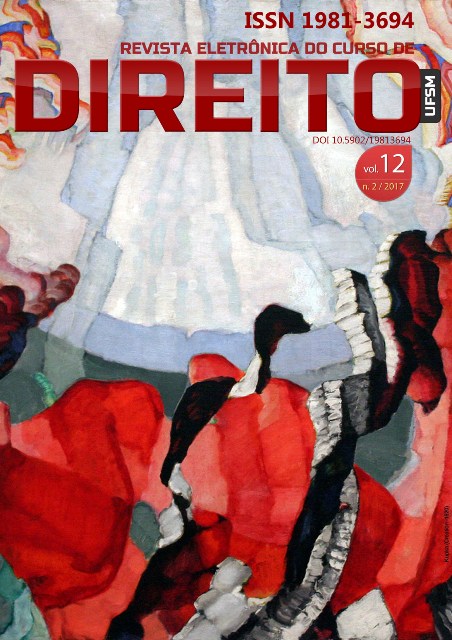ACADEMIC COLLABORATIONS IN THE AMERICAS: SOME REFLECTIONS ON THE POLITICAL ECONOMY OF LEGAL KNOWLEDGE
DOI:
https://doi.org/10.5902/1981369427197Keywords:
Law Theory, Legal knowledge, International collaborations, Political Economy of Law.Abstract
The article proceeds in three parts. The first, the articles’ analytical heart, considers the political economy of legal knowledge. It describes briefly the free market of legal ideas and the colonial model for the production of legal knowledge. It illustrates how these two models work using examples from our “South-North Partnerships” (SNP), that is, our collaborative practices in the creation of legal thought as they play out in the legal academies of the global North and South. The second part is both descriptive and reflective, focusing on four different SNP examples that illustrate challenges in the creation of truly collaborative legal knowledge production processes. It identifies common challenges in these endeavors, from surmounting basic organizational issues such as language barriers to jostling with fundamentals like conflicting academic calendars. Most importantly, the second part indicates how the dynamics of the political economy of legal knowledge played out in the SNPs described. It also highlights possible ways to equalize these relationships and activities, with an end to creating SNPs focused on truly collaborative legal knowledge production. The third part offers conclusions and recommendations.
Downloads
References
Arocena, Rodrigo, and Judith Sutz. 2005. “Latin American Universities: From an Original Revolution to an Uncertain Transition.” Higher Education 50 (4): 573–592.
Bonilla, Daniel. 2013a. Introduction in Daniel Bonilla (ed)., Constitutionalism of the Global South: The Three Activist Courts of India, South Africa and Colombia, Cambridge University Press).
Bonilla, Daniel. 2013b Legal Clinics in the Global North and South: Between Equality and Subordination, 16 Yale Hum. Rts. & Dev. L.J. 176.
Bonilla, Daniel. 2015. “La economía política del conocimiento jurídico”, 26 Brazilian Journal of Empirical Legal Studies vol. 2, n. 1.
Boroditsky, Lera. 2009. How Does Our Language Shape the Way We Think?, in Brockman, Max. (ed.). What’s Next? Dispatches on the Future of Science. New York: Random House.
Carroza, Paolo. 2006. “La perspectiva histórica del aporte latinoamericano al concepto de los derechos económicos, sociales y culturales”, in Alicia Ely Yamin (ed.), Derechos económicos, sociales y culturales en América Latina: Del inventivo a la herramienta.
Centro Agronómico Tropical de Investigación y Enseñanza (CATIE: Center for Tropical Agricultural Research and Education). 2012. Acerca de Nosotros [About Us]. Turrialba, Costa Rica: CATIE. Available online at: http://catieeducacion-web.sharepoint.com/Pages/aboutus.aspx, accessed on 20 January 2014.
Centro Agronómico Tropical de Investigación y Enseñanza (CATIE: Center for Tropical Agricultural Research and Education). 2011a. Biennial Report 2010-2011. Turrialba, Costa Rica: CATIE.
Centro Agronómico Tropical de Investigación y Enseñanza (CATIE: Center for Tropical Agricultural Research and Education). 2011b. Iniciativa: Costa Rica País del Conocimiento [Initiative: Costa Rica, Country of Knowledge]. Presentation at Initiative Meeting I, June 28, 2011, Holiday Inn Hotel, Escazu, Costa Rica: CATIE.
Consejo de la Enseñanza Privada Superior [CEPS: Council of Private Higher Education]. 2012.
Acerca de CEPS [About CEPS]. Guatemala City, Guatemala: CEPS. Available online at: http://www.ceps.edu.gt, accessed on 20 January 2014.
Culum, Bojana, Roncevic, Nena and Ledic, Jasminka. 2013. “Facing New Expectations. Integrating Third Mission Activities into the University.” In The Changing Academy. The Changing Academic Profession in International Perspective, volume 5, edited by Kehm, Barbara M, and Teichler, Ulrich. London, UK: Springer.
Domingo Pilar and Sieder, Rachel (eds.). 2001. Rule of Law in Latin America: The International Promotion of Judicial Reform 1.
Duguit, León, 1919. Law in the Modern State.
Fricker, Miranda. 2007. Epistemic Justice.
EARTH University. 2012. About EARTH. San José, Costa Rica: EARTH University. Available online at: http://www.earth.ac.cr/?lang=en, accessed on 20 January 2014.
Esquirol, Jorge L. 2003. Continuing Fictions of Latin American Law, 55. Fla. L. Rev. 41.
Esquirol, Jorge L. 2008. The Failed Law of Latin America, 56 Am. J. Comp. L. 75.
Esquirol, Jorge L. 2013. Legal Latin Americanism. 16 Yale Hum. Rts. & Dev. L. J.
Facultad Latinoamericana de Ciencias Sociales Costa Rica [FLACSO: Latin American School of Social Sciences Costa Rica]. 2012. Acerca de… [About …]. Curridabat, Costa Rica: FLACSO Costa Rica. Available online at: http://www.flacso.or.cr, accessed on 20 January 2014.
Global Higher Education. 2012. Educational Hubs. Cross-Border Education Research Team (C-BERT). Albany, NY: State University of New York at Albany. Available online at: http://www.globalhighered.org/edhubs.php, accessed on 20 January 2013.
Gomes, Marcelo and Singer, Helena. 2001 Sociology of Law in Brazil: A Critical Approach, Am. Sociologist, Summer.
Graziadei, Michele. 2009. Legal Transplants and the Frontiers of Legal Knowledge. 10 Theoretical Inquiries L. 723.
Holm-Nielsen, Lauritz B., Thorn, Kristian, Brunner, José Joaquín, and Balán, Jorge. 2005. Regional and International Challenges to Higher Education in Latin America. Washington, DC: World Bank.
Huneeus, Alexandra et al. 2010. Introduction in Cultures of Legality: Judicialization and Political Activism in Latin America, Alexandra Hunee, et al., eds., Cambridge University Press.
INCAE Business School. 2012. About Us. Available online at: http://www.incae.edu/en/master-programs/mba-costa-rica.php, accessed on 20 January 2013.
Huneeus, Alexandra et al. 2012. Centro Latinoamericano para la Competitividad y el Desarrollo Sostenible (CLACDS). Available online at: http://www.incae.edu/es/clacds/, accessed on 20 January 2013.
Iturralde, Manuel. 2013. Access to constitutional justice in Colombia: opportunities and challenges for social and political change, in Constitutionalism of the Global South: The Three Activist Courts of India, South Africa and Colombia, Cambridge University Press).
Kahn Paul. 1999. The Cultural Study of Law.
Knight, Jane. 2011. “Education Hubs: A Fad, a Brand, an Innovation?” Journal of Studies in International Education 15 (3): 221-240.
Kumar Jain, Adishwar. 2011. “Calidad y Acreditación en la Educación Superior en Centroamérica” [Quality and Accreditation in the Higher Education of Central America]. ICAP-Revista Centroamericana de Administración Pública [ICAP-Central American Journal of Public Administration] (60-61): 29-57.
Lakoff, George and Johnson, Mark. 2003. Metaphors We Live By. Chicago: University of Chicago Press.
Levy, Daniel C. 1996. Building the Third Sector: Latin America’s Private Research Centers and Nonprofit Development. Pittsburgh, PA: University of Pittsburgh Press.
Makau, Mutua. 2000. What is Twail? American Society of International Law, Proceedings of the 94th Annual Meeting.
Mattei, Ugo. 1998. An Opportunity Not to Be Missed: The Future of Comparative Law in The United States, 48 Am. J. Comp. L. 712.
Menski, Werner. 2006. Comparative Law in Global Context, in The Legal Systems of Asia and Africa, Cambridge University Press.
Mickelson, Karin. 2009. Beyond a Politics of the Possible? South-North Relations and Climate Justice, 10 Melbourne J. of Int'l L. 41-423.
Ministerio de Educación [MINED: Ministry of Education]. 2012. Centros Educativos. San Salvador, El Salvador: MINED. Available online at: https://www.mined.gob.sv, accessed on 20 January 2013.
Ministerio de Educación [MEDUCA: Ministry of Education]. 2012. Centros Educativos [Education Centers]. Panamá: MEDUCA. Available online at: http://www.meduca.gob.pa, accessed on 20 January 2013.
Morris, Rosalind and Spivak, Gayatri. 2010. Can the Subaltern Speak?
Müller, Luis T. Díaz. 1997. “Derechos económicos, sociales y culturales: aportación de México”, Boletín Mexicano de Derecho Comparado 88.
Murillo, María Victoria. 2005. “Partisanship Amidst Convergence: The Politics of Labor Reform in Latin America”, 37 Comparative Politics.
Organisation for Economic Cooperation and Development (OECD), Economic Commission for Latin America and the Caribbean (ECLAC). 2011. Latin American Economic Outlook 2012: Transforming the State for Development. Paris: OECD Publishing. Available online at: http://dx.doi.org/10.1787/leo-2012-en, accessed on 20 January 2013.
OECD. 2012. OECD Family Database. Paris: France: OECD. Available online at: http://www.oecd.org/social/family/database, accessed on 20 January 2013.
Partnership for Educational Revitalization in the Americas (PREAL). 2007. A Lot to Do: A Report Card on Education in Central America and the Dominican Republic. Washington, DC: PREAL, Task Force on Education Reform in Central America.
Pérez-Perdomo, Rogelio. 2005. Rule of Law and Layers in Latin American, Annals of the American Academy of Political and Social Science.
Reimers, Fernando. 2012. “Innovating Universities.” ReVista Harvard Review of Latin America (Fall). Available online at: http://drclas.harvard.edu/publications/revistaonline/fall-2012/innovating-universities, accessed on 20 January 2013.
Roy, Alpana. 2008. “Postcolonial Theory and Law: A Critical Introduction”, Adelaide Law Review 29.
Ruskola, Teemu. 2002. Legal Orientalism, 101 Mich. L. Rev. 179-234.
RTN Noticias. 2012. “CATIE Propone a Costa Rica como Destino del Conocimiento” [CATIE Proposes Costa Rica as a Knowledge Destination]. Available online at: http://www.sinart.go.cr, accessed on 20 January 2013.
Rubio F. and Baert P. (Eds.). 2012. The Politics of Knowledge.
Sousa Santos, Boaventura de. 1995. “Three Metaphors for a New Conception of Law: The Frontier, the Baroque and the South”, 29 (4) Law & Soc’y Rev.569-584.
Stewart, Barry. 1998. Political Economy: A Comparative Approach. Westport: Connecticut and London.
Svenson, Nanette. 2012. “R&D in Central America: Panorama and Prospects for International Cooperation.” Higher Education 23 (September): 1-16.
Svenson, Nanette, and Montoto, Lisette. 2012. “Universities and the Knowledge Hubs of the Developing World: An in-depth look at the City of Knowledge in the Republic of Panama.” Educación Global 16 (63): 53-69.
Thorn, Kristian, and Soo, Maarja. 2006. “Latin American Universities and the Third Mission: Trends, Challenges and Policy Options.” World Bank Policy Research Working Paper 4002. Washington, DC: Word Bank. pp. 1-23.
United Nations Development Programme (UNDP). 2012. UNDP human development reports. International human development indicators. http://hdr.undp.org/en/statistics/.
United Nations Educational, Scientific and Cultural Organisation (UNESCO). 2007. The State of Education in Latin America and the Caribbean: Guaranteeing Quality Education for All. Santiago, Chile: UNESCO Regional Bureau of Education for Latin America and the Caribbean.
UNESCO Institute for Statistics. 2012. Data Centre. http://www.uis.unesco.org/
UNESCO International Institute for Higher Education in Latin America and the Caribbean (UNESCO-IESALC). 2010. La Universidad Latinoamercana en Discusión [Discussion of the Latin American University]. Caracas, Venezuela: UNESCO-IESALC.
Universidad del Valle de Guatemala [University of the Valley of Guatemala]. 2012. Investigación. Guatemala City, Guatemala: University of the Valley of Guatemala. Available online at: http://www.uvg.edu.gt, accessed on 20 January 2013.
Universidad para la Paz (UPEACE) [University for Peace]. 2012. About UPEACE. Ciudad Colón, Costa Rica: UPEACE. Available online at: http://www.upeace.org/about/, accessed on 20 January 2013.
UPEACE. 2011. The Hon. Ruth Dreifuss at UPEACE. UPEACE News Flash (October 11). Available online at: http://www.upeace.org/news/newsflash/2011/NFOctober2011.pdf, accessed on 20 January 2013.
Wilson, Matthew J. 2013. Improving the Process: Transnational Litigation and the Application of Private Foreign Law in U.S. Courts. 45 N.Y.U. J. Int'l L. & Pol. 1111
World Bank. 2005. Central American Education Strategy: An Agenda for Action. Washington, DC: World Bank.
World Bank. 2012a. Data—World development indicators. Washington, DC: World Bank. Available online at: http://data.worldbank.org/indicator, accessed on 20 January 2013.
World Bank. 2012b. Worldwide governance indicators. Government Effectiveness. Washington, DC: World Bank. Available online at: http://info.worldbank.org/governance/wgi/index.asp, accessed on 20 January 2013.
Zaglul, Jose, and Sherrard, Daniel. 2005. “Higher Education in Economic Transformation.” In Going for Growth: Science, Technology and Innovation in Africa, edited by Calestous Juma (pp. 34-44). London, UK: The Smith Institute.
Zamorano. 2012. Explore Zamorano. http://www.zamorano.edu/english/, accessed on 20 January 2013.
Downloads
Published
How to Cite
Issue
Section
License

Este obra está licenciado com uma Licença Creative Commons Atribuição-NãoComercial-SemDerivações 4.0 Internacional.








